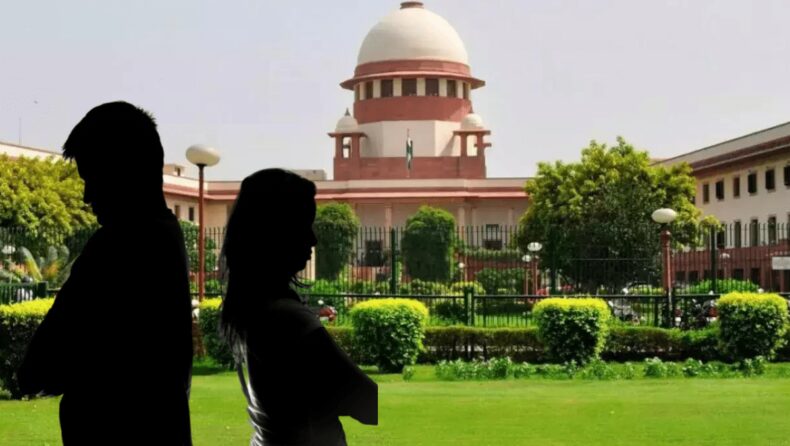A bench of the Supreme Court headed by Justice S.K. Kaul today held that the Apex Court can use its powers under Article 142 of the Constitution to grant a divorce in cases of an irretrievable breakdown of a marriage.
Further, the bench also held that the mandatory waiting period of a minimum of 6 months as per S. 13-B of the Hindu Marriage Act of 1955 can also be waived off (subject to the conditions) using the plenary powers of the Supreme Court.
The landmark judgement of the Supreme Court was on the issue that, whether the Supreme Court can grant a divorce on the grounds of irretrievable breakdown of a marriage and can the Supreme Court waive off the mandatory waiting period using its power under Article 142 of the Indian Constitution.
The Constitutional bench comprising Justice Sanjay Kishan Kaul, Vikram Nath, JK Maheshwari, Sanjiv Khanna and AS Oka observed while pronouncing the judgement that the Supreme Court can exercise its power under Article 142 of the Constitution.

The bench also held that the Court can waive the mandatory waiting period of six months as specified under Section 13-B of the Hindu Marriage Act of 1955.
Section 13-B of the H.M. Act states that after filing an application for divorce through mutual consent the husband and wife have to wait for a period of 6 months to 18 months before the court passes a decree of divorce. This waiting period is a mandate to allow the parties to rethink the decision they have made.
Furthermore, Article 142 of the Constitution empowers the Supreme Court to use its plenary powers to pass any order or decree for doing ‘complete justice’ in a matter pending before the Supreme Court.
The following case was referred to the five-judge bench in June 2016 by the division bench of Justice Shiva Kirti Singh and Justice R Banumathi considering a transfer petition for the Constitutional bench.
Supreme Court on divorce waiting mandate
In Amardeep Singh V. Harveen Kaur (2017), the division bench held that the waiting period of 6 months stated under Section 13-B of the H.M. Act is not a mandate and it can be waived off if the Family court is satisfied by the facts of the case.

Earlier, the Supreme Court also invoked Article 142 in a few cases to relinquish the minimum waiting period. The Court used this power in a few cases where the appeal was transferred to the Supreme Court in matrimonial matters where the parties mutually consented to divorce with a waiting period.
In 2015, a Constitutional bench was referred by a three-judge bench to decide whether Article 142 can be invoked to waive off the waiting period with a statutory requirement.
Responding to the issue raised by the three-judge bench, the Constitutional bench held that Article 142 can be invoked to waive the mandatory waiting period to do ‘Complete justice’.
However, power under Article 142 is discretionary and must be used with due care and caution, the Constitutional bench said.













